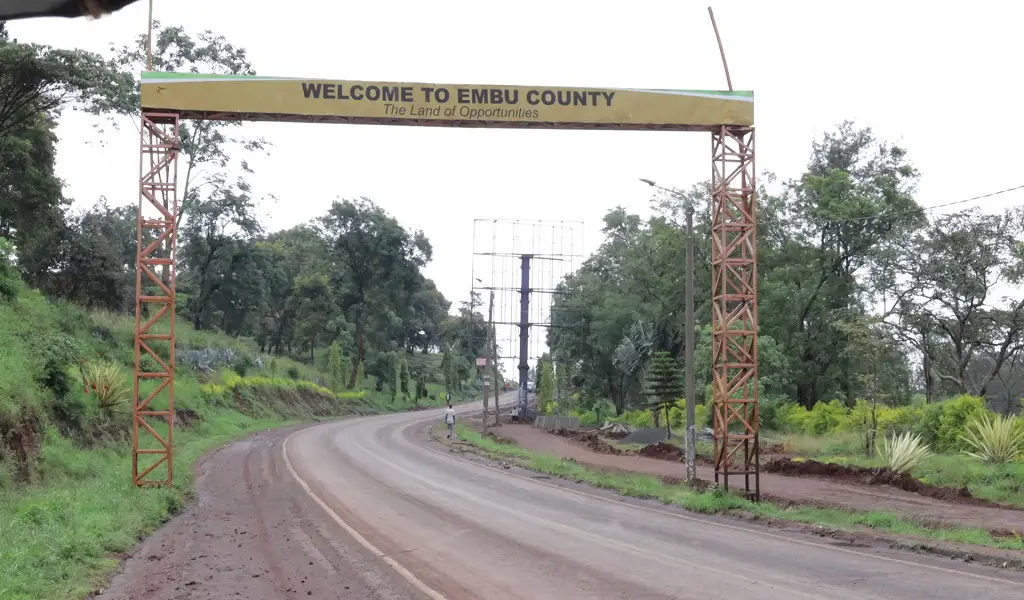Imagine exploring a county in Kenya that is rich in cultural heritage, breathtaking landscapes, and vibrant communities. Embu County offers all of this and more. Nestled in the central part of the country, this hidden gem invites you to embark on a journey of discovery, immersing yourself in the warmth of its people and the beauty of its surroundings. From its stunning waterfalls and lush tea plantations to its vibrant markets and traditional festivals, Embu County is a destination that promises a truly unforgettable experience. So, pack your bags and get ready to be captivated by the wonders that await you in Embu County.
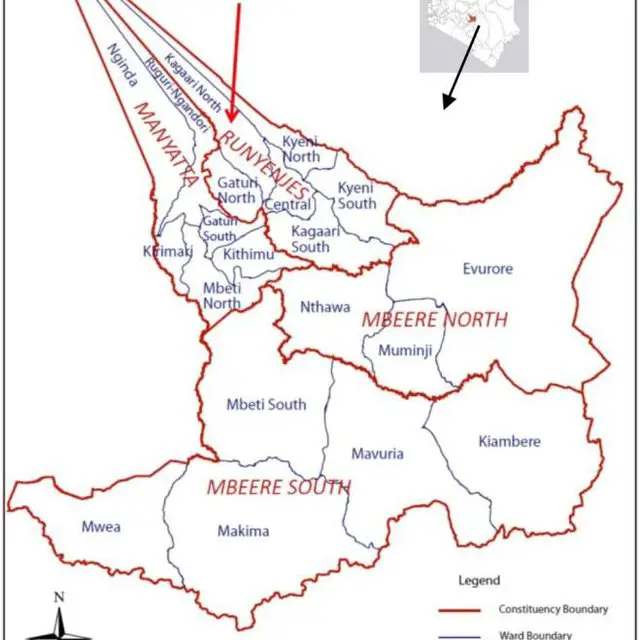
This image is property of www.embu.go.ke.
Geography
Location
Embu County is located in the Eastern region of Kenya. It is situated approximately 120 kilometers northeast of Nairobi, the capital city of Kenya. The county borders Tharaka Nithi to the east, Meru to the north, Kirinyaga to the west, and Machakos and Kitui to the south.
Topography
The topography of Embu County is characterized by varied landscapes. The western region is mountainous, with the iconic Mount Kenya dominating the skyline. There are also several hills, such as Kirimiri Hill and Mwea Hill, that offer breathtaking views of the surrounding countryside. In the eastern part of the county, the landscape transitions into a flatter terrain, ideal for agriculture.
Climate
Embu County experiences a subtropical highland climate. The region enjoys relatively temperate and moderate conditions throughout the year. The county has two rainy seasons, with the long rains occurring between March and May and the short rains between October and December. The average annual rainfall ranges between 900 and 1300 millimeters. The temperature varies between 10 and 25 degrees Celsius, making it favorable for various activities and agriculture.
History
Early settlements
Embu County has a rich history with evidence of early human settlements dating back thousands of years. The county was inhabited by the Embu people, a Bantu ethnic group. These early settlers practiced agriculture and reared livestock, establishing thriving communities in the region.
Colonial era
During the colonial era, the British established a presence in Embu County. The colonial government introduced cash crops such as coffee, tea, and cotton, which significantly transformed the county’s economy. It also led to the construction of infrastructure such as roads and railway lines, enhancing connectivity and trade within the county.
Independence and development
After Kenya gained independence in 1963, Embu County became part of the newly formed Republic. The county has since experienced significant development in various sectors, including education, healthcare, and infrastructure. Today, Embu County is a vibrant region with a growing economy and a proud cultural heritage.
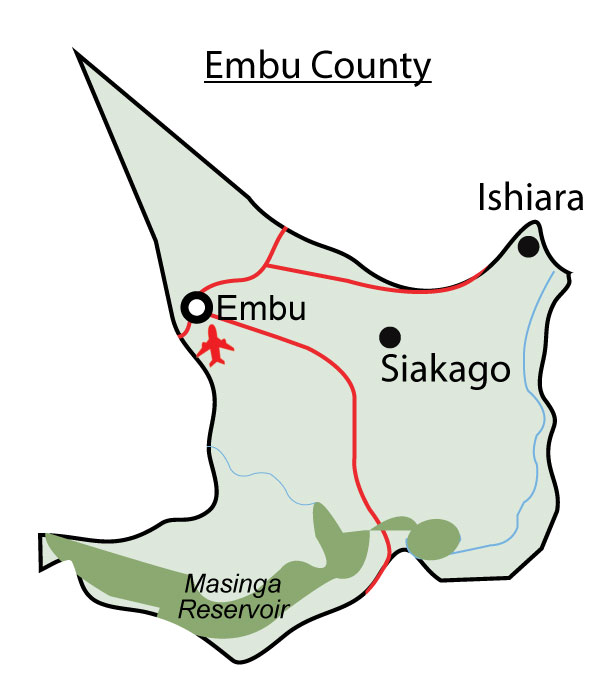
This image is property of elimufeynman.s3.amazonaws.com.
Demographics
Population
As of the latest census, Embu County has a population of approximately 600,000 people. The population is evenly distributed across both rural and urban areas.
Ethnic groups
The Embu community is the predominant ethnic group in the county, accounting for a significant percentage of the population. Other ethnic groups include the Kikuyu, Meru, Kamba, and Mbeere, among others. The county is known for its cultural diversity and harmonious coexistence among different communities.
Languages
Embu County is linguistically diverse, with multiple languages spoken within its borders. The most widely spoken languages include Embu, Kikuyu, Meru, and Kamba. Swahili and English are also commonly used as lingua francas.
Religion
Religion plays a significant role in the lives of the residents of Embu County. The majority of the population practices Christianity, with various denominations represented, including Protestant and Catholic churches. There is also a significant population that adheres to traditional African religious beliefs.
Economy
Agriculture
Agriculture is the backbone of Embu County’s economy. The region is known for its fertile soil and favorable climatic conditions, making it ideal for crop cultivation. Cash crops such as coffee, tea, and pyrethrum are major contributors to the county’s economy. Farmers also grow food crops such as maize, beans, and vegetables for both subsistence and commercial purposes.
Tea farming
Tea farming is a significant economic activity in Embu County. The region boasts vast tea plantations that produce high-quality tea leaves. Tea farming provides employment opportunities for local residents and contributes to the national tea exports, earning foreign exchange for the country.
Tourism
Embu County is a hidden gem for tourists seeking to explore Kenya’s natural beauty. The county boasts several tourist attractions, including the Mount Kenya National Park, where visitors can enjoy wildlife safaris and hiking trails. Other notable attractions include the Chuka Tree Canopy Walk, Fourteen Falls, and Kirimiri Hill, all offering unique experiences for tourists.
Manufacturing
The county has a budding manufacturing sector that contributes to its economic growth. Small-scale industries engage in the production of textiles, leather products, and processed agricultural products such as tea and coffee. These industries provide employment opportunities and contribute to the county’s GDP.
Trade and commerce
Trade and commerce play a vital role in Embu County’s economy. The county has vibrant marketplaces where agricultural produce and other goods are bought and sold. The towns of Embu and Runyenjes are the main commercial centers, attracting traders from within and outside the county.
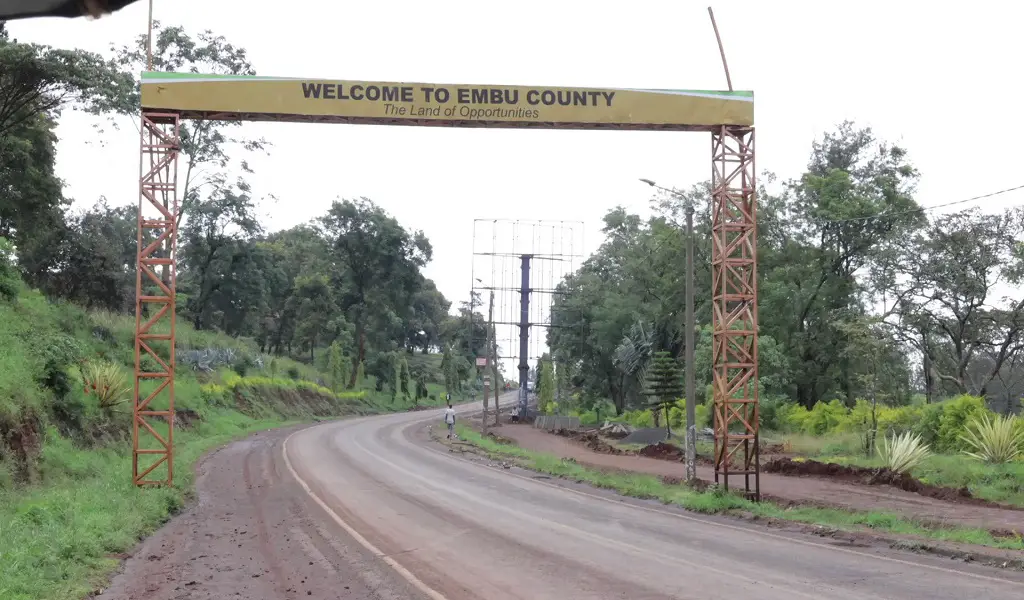
This image is property of i0.wp.com.
Culture and Arts
Traditional music and dance
Embu County is renowned for its vibrant traditional music and dance. The Embu community has a rich cultural heritage that is expressed through various traditional songs, accompanied by drums and other traditional musical instruments. Traditional dances such as the Mwomboko and Kibandi are performed during cultural festivals and social gatherings, showcasing the county’s cultural diversity.
Traditional clothing and attire
The people of Embu County proudly wear traditional clothing during cultural ceremonies and events. The traditional attire includes colorful fabrics adorned with intricate beadwork and embroidery. Men often wear a shuka (a wraparound cloth) or trousers, while women wear dresses or skirts paired with beautifully decorated accessories.
Cuisine
Embu County offers a diverse range of culinary delights. Traditional foods such as mukimo (mashed potatoes, corn, and peas), irio (a dish of mashed potatoes and peas), and githeri (a mix of maize and beans) are popular among the locals. Visitors can also sample nyama choma (grilled meat) and a variety of fresh fruits and vegetables.
Art and craft
Art and craft are highly valued in Embu County, with skilled artisans producing beautiful handmade artifacts. These include woven baskets, woodcarvings, pottery, and beadwork. The county’s art and craft sector provides employment opportunities and serves as a source of income for local communities.
Education
Primary education
Embu County is committed to providing quality primary education to its residents. The county has numerous primary schools, both public and private, that offer a comprehensive curriculum. Efforts have been made to improve access to education and enhance the quality of teaching and learning in primary schools.
Secondary education
Secondary education is also a priority in Embu County. The county boasts several secondary schools that provide students with a well-rounded education. The curriculum includes academic subjects, as well as co-curricular activities such as sports and arts.
Tertiary education
Embu County is home to reputable tertiary institutions that offer various courses and programs. The Embu University College is one such institution, offering undergraduate and postgraduate programs in various fields of study. Tertiary education plays a crucial role in equipping students with the skills and knowledge needed for the job market.
Vocational training
Embu County recognizes the importance of vocational training in equipping individuals with practical skills for employment. The county supports vocational training institutions that offer courses in fields such as agriculture, carpentry, tailoring, and beauty therapy.
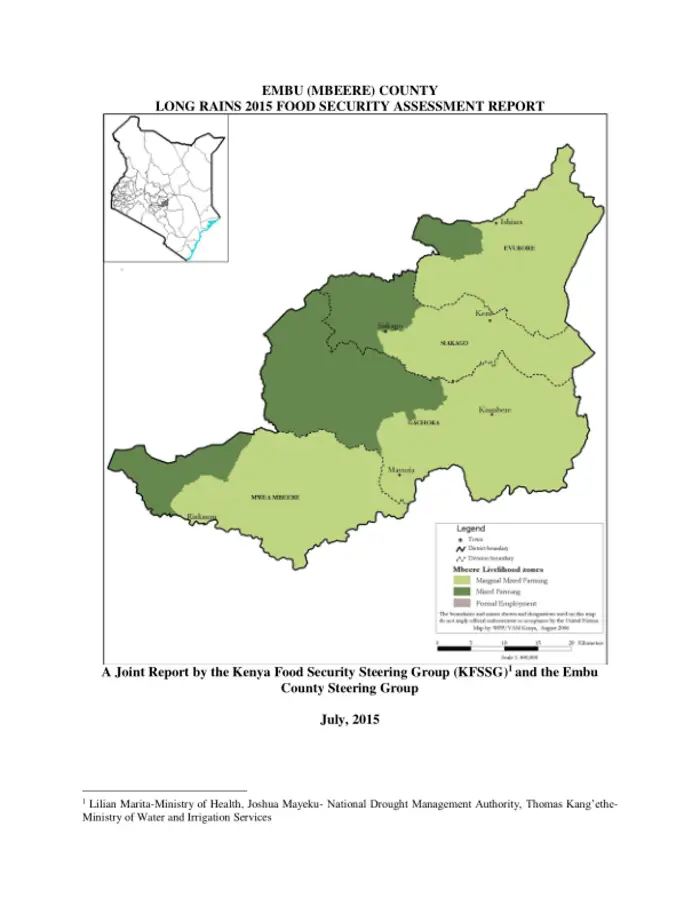
This image is property of reliefweb.int.
Healthcare
Hospitals and medical facilities
Embu County has made significant progress in improving healthcare facilities. The county boasts several hospitals and medical centers that provide essential healthcare services to the residents. Notable healthcare facilities include the Embu Level 5 Hospital, Runyenjes Level 4 Hospital, and private clinics scattered across the county.
Disease prevention and control
Embu County emphasizes disease prevention and control to ensure the well-being of its residents. The county government collaborates with various stakeholders to implement vaccination campaigns, promote hygiene practices, and conduct health education programs. Regular screenings and immunizations are also conducted to prevent the spread of diseases.
Health programs and initiatives
The county government of Embu implements various health programs and initiatives to address the specific healthcare needs of the residents. These include maternity and child health programs, HIV/AIDS prevention and treatment programs, and mental health awareness campaigns. The county also promotes family planning services to ensure reproductive health.
Infrastructure
Transportation
Embu County has an extensive transportation network that facilitates movement within and outside the county. The region is served by tarmacked roads, which connect major towns and villages. Public transport, including buses and matatus (minibusses), provides affordable transportation options for residents.
Road networks
The county government invests in maintaining and expanding the road networks in Embu County. This ensures smooth transportation and enhances connectivity with neighboring counties. Efforts have been made to upgrade rural roads, allowing farmers to transport their produce to markets easily.
Telecommunications
Embu County benefits from reliable telecommunications infrastructure. Mobile phone networks cover most areas, ensuring connectivity for residents. Internet services are accessible, enabling individuals to engage in online activities and businesses to thrive in the digital era.
Energy and electricity
Access to electricity is crucial for social and economic development. The county government, in collaboration with national power suppliers, works to ensure a reliable supply of electricity to all areas of Embu County. Renewable energy sources such as solar power are also being explored to promote sustainable energy practices.
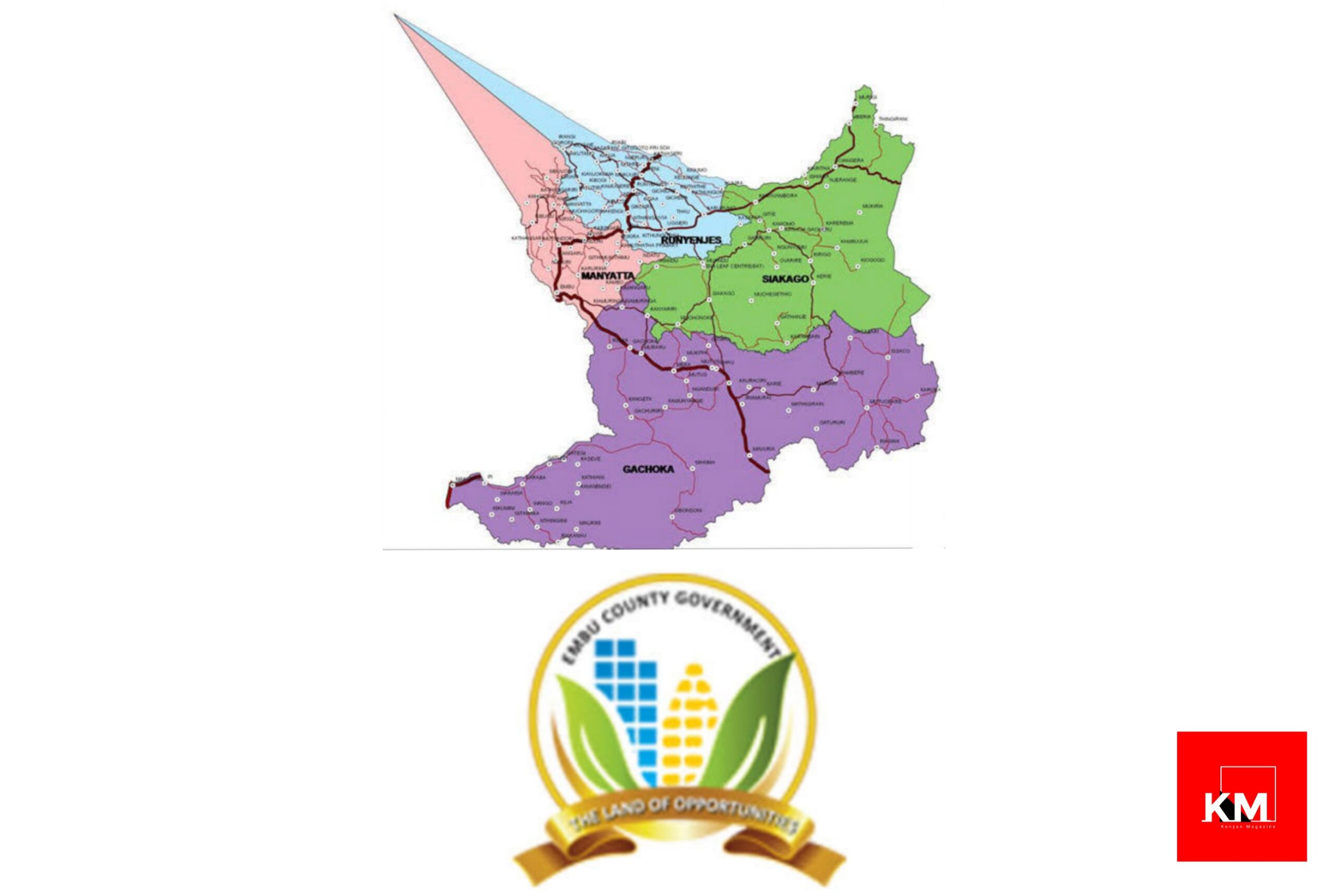
This image is property of kenyanmagazine.co.ke.
Governance
County government
Embu County has a devolved system of governance, with a county government headed by an elected governor. The county government is responsible for the management and provision of services to the residents. It plays a vital role in promoting economic development, improving infrastructure, and implementing policies that benefit the county.
County assembly
The county assembly is the legislative arm of the county government. It consists of elected representatives who are responsible for making laws and overseeing the activities of the county government. The county assembly ensures accountability and transparency in governance and plays an essential role in decision-making processes.
Political representation
Embu County is represented in the national government through elected members of parliament and senators. These representatives advocate for the needs and interests of the county at the national level, ensuring that Embu County’s concerns are heard and addressed.
Tourist Attractions
Mount Kenya National Park
Mount Kenya National Park is a UNESCO World Heritage site and a popular tourist attraction in Embu County. The park offers breathtaking scenery, diverse wildlife, and opportunities for hiking and mountaineering. Visitors can explore the different ecosystems found on the mountain and enjoy the panoramic views from its peaks.
Chuka Tree Canopy Walk
The Chuka Tree Canopy Walk is a unique attraction that allows visitors to walk on suspended bridges among the treetops. This thrilling experience provides a bird’s eye view of the surrounding forest and offers an opportunity to observe various bird species and other wildlife.
Fourteen Falls
Located on the Athi River, Fourteen Falls is a spectacular waterfall that captivates visitors with its beauty and power. The falls offer a refreshing escape from the bustling city life and provide a serene environment for picnics and relaxation.
Kirimiri Hill
Kirimiri Hill is a scenic hill located in Embu County, offering stunning views of the surrounding countryside. Visitors can hike to the top of the hill and enjoy panoramic views of tea plantations, farmland, and the distant mountains.
Mwea National Reserve
The Mwea National Reserve is a conservation area that showcases the diverse flora and fauna of Embu County. Visitors can enjoy game drives, birdwatching, and nature walks in this picturesque reserve. The reserve is home to various wildlife species, including elephants, buffalos, and antelopes.
In conclusion, Embu County is a diverse and vibrant region of Kenya that offers natural beauty, rich cultural heritage, and economic opportunities. From its stunning landscapes to its thriving agricultural sector, Embu County has something to offer for everyone. Whether it’s exploring the wildlife in national parks or immersing oneself in the local culture, Embu County invites you to discover the wonders it has to offer.

